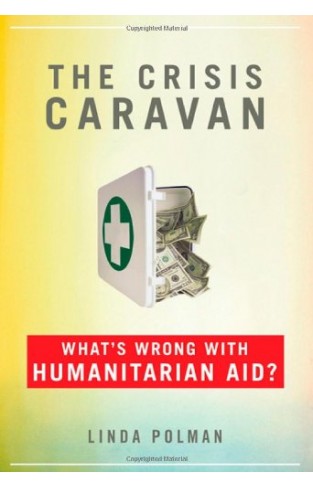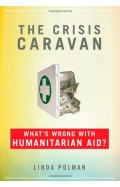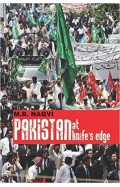- Home
- Book Bazaar RP Up To 60% Off
- RP - Current Affairs
- The Crisis Caravan: What's Wrong with Humanitarian Aid?
The Crisis Caravan: What's Wrong with Humanitarian Aid?
By: Linda Polman
-
Rs 790.00
Due to constant currency fluctuation, prices are subject to change with or without notice.
We're offering a high
discount on this book as it is slightly damaged
A vast industry has grown up around humanitarian aid: a cavalcade of organizations—some 37,000—compete for a share of the $160 billion annual prize, with "fact-inflation" sometimes ramping up disaster coverage to draw in more funds. Insurgents and warring governments, meanwhile, have made aid a permanent feature of military strategy: refugee camps serve as base camps for genocidaires, and aid supplies are diverted to feed the troops. Even as humanitarian groups continue to assert the holy principle of impartiality, they have increasingly become participants in aid's abuses.
In a narrative that is impassioned, gripping, and even darkly absurd, journalist Linda Polman takes us to war zones around the globe—from the NGO-dense operations in "Afghaniscam" to the floating clinics of Texas Mercy Ships proselytizing off the shores of West Africa—to show the often compromised results of aid workers' best intentions. It is time, Polman argues, to impose ethical boundaries, to question whether doing something is always better than doing nothing, and to hold humanitarians responsible for the consequences of their deeds
We're offering a high
discount on this book as it is slightly damaged
A vast industry has grown up around humanitarian aid: a cavalcade of organizations—some 37,000—compete for a share of the $160 billion annual prize, with "fact-inflation" sometimes ramping up disaster coverage to draw in more funds. Insurgents and warring governments, meanwhile, have made aid a permanent feature of military strategy: refugee camps serve as base camps for genocidaires, and aid supplies are diverted to feed the troops. Even as humanitarian groups continue to assert the holy principle of impartiality, they have increasingly become participants in aid's abuses.
In a narrative that is impassioned, gripping, and even darkly absurd, journalist Linda Polman takes us to war zones around the globe—from the NGO-dense operations in "Afghaniscam" to the floating clinics of Texas Mercy Ships proselytizing off the shores of West Africa—to show the often compromised results of aid workers' best intentions. It is time, Polman argues, to impose ethical boundaries, to question whether doing something is always better than doing nothing, and to hold humanitarians responsible for the consequences of their deeds
The Crisis Caravan: What's Wrong with Humanitarian Aid?
By: Linda Polman
Rs 790.00 Ex Tax :Rs 790.00
Zubin Mehta: A Musical Journey (An Authorized Biography)
By: VOID - Bakhtiar K. Dadabhoy
Rs 840.00 Rs 1,050.00 Ex Tax :Rs 840.00
What?: Are These Really the Twenty Most Important Questions in Human History?
By: Mark Kurlansky
Rs 920.00 Rs 1,150.00 Ex Tax :Rs 920.00
Myths Illusions and Peace: Finding a New Direction for America in the Middle East
By: Dennis Ross
Rs 1,095.00 Ex Tax :Rs 1,095.00
Operation Dark Heart: Spycraft And Special Ops On The Frontlines Of Afghanistan And The Path To Victory
By: Anthony Shaffer
Rs 1,800.00 Rs 2,250.00 Ex Tax :Rs 1,800.00
Anna Hazare: The Face Of Indias Fight Against Corruption
By: Pradeep Thakur
Rs 300.00 Ex Tax :Rs 300.00
How To Win A Cosmic War God Globalization And The End Of War
By: Reza Aslan
Rs 695.00 Ex Tax :Rs 695.00
A Long Time Comming: The Inspiring Combative 2008 Campaign And
By: Evan Thomas
Rs 795.00 Ex Tax :Rs 795.00
What?: Are These Really the Twenty Most Important Questions in Human History?
By: Mark Kurlansky
Rs 920.00 Rs 1,150.00 Ex Tax :Rs 920.00
No recently viewed books available at the moment.
Zubin Mehta: A Musical Journey (An Authorized Biography)
By: VOID - Bakhtiar K. Dadabhoy
Rs 840.00 Rs 1,050.00 Ex Tax :Rs 840.00
The Crisis Caravan: What's Wrong with Humanitarian Aid?
By: Linda Polman
Rs 790.00 Ex Tax :Rs 790.00
What?: Are These Really the Twenty Most Important Questions in Human History?
By: Mark Kurlansky
Rs 920.00 Rs 1,150.00 Ex Tax :Rs 920.00














-120x187.jpg?q6)















